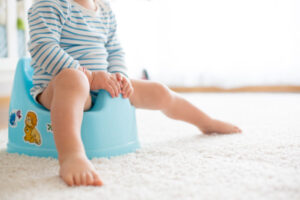 Learning to use the toilet or potty is a big step for a toddler, some learn quickly while others need lots of gentle support. It's best to take it slowly and go at your child's pace. Being patient with them will help them get it right even if you sometimes feel frustrated.
Learning to use the toilet or potty is a big step for a toddler, some learn quickly while others need lots of gentle support. It's best to take it slowly and go at your child's pace. Being patient with them will help them get it right even if you sometimes feel frustrated.
Children are able to control their bladder and bowels when they're physically ready and when they want to be dry and clean. Every child is different, so it's best not to compare your child with others.
Children tend to be ready for potty training at different ages but most children show signs of readiness between the ages of two and two-and-a-half. Your child:
- knows when they've got a wet or dirty nappy
- can tell you they’re doing a wee
- has at least an hour between wees. Potty training may be very difficult if they wee more frequently
- fidgets or goes somewhere quiet or hidden to wee
- knows when they need to wee and may tell you before they do it.
Getting ready for potty training
Your child also needs to be able to sit and get up from the potty themselves when they’ve finished. Having regular wees and poos or ‘healthy bladder and bowel habits’ is also important.

Using a potty will be new to your child, so get them used to the idea gradually by talking to them about the potty or encouraging them to sit on a potty. You can find out more about starting potty training from NHS.uk or read ERIC’s top tips. The Starting Reception website also has a useful guide.
ERIC has useful information for carers supporting children with additional needs in potty training. Bladder and Bowel UK offer support for those children and young people with bladder and bowel problems.
All children are different and some take quickly to potty training while for others it can take more time. Potty training can feel like hard work, but don't worry you will get there in the end. Contact your local Health Visiting Team for more support if you’re struggling. We offer a monthly virtual session to help parents prepare for potty training and we can also support families one-to-one if day and night-time wetting, constipation are a significant issue or your child has additional needs.
The Kent Health Visiting Team has put together a series of videos to support you at this time, starting with:
Session one: Signs your child is ready to potty train
Session two: What you’ll need to start potty training
Session three: Fluid intake, constipation and children who refuse to use the toilet
Session four: Supporting your child with additional needs
Your child with additional needs
Almost all children can learn to be clean and dry. Children with special needs including delayed development and physical disabilities may take a little longer and need more support. However, the process you need to follow is the same.
This can feel like a big challenge, but it's important not to put off potty training for too long. The longer your child wears a nappy, the harder it may be to introduce a new place for them to wee and poo.
Eric has some useful information to support your child with additional needs or sensory issues.
Useful resources
- Find out more about potty training from NHS.uk or read ERIC’s top tips.
Page last reviewed: 01/01/2025, next review due: 01/01/2028